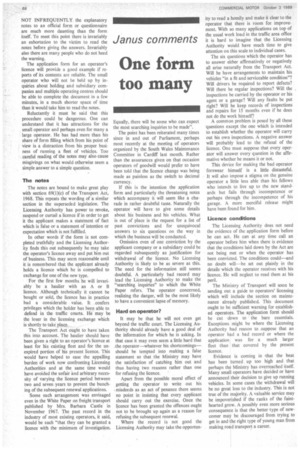Janus comments
Page 74

If you've noticed an error in this article please click here to report it so we can fix it.
One form too many
Equally, there will be some who can expect the most searching inquiries to be made".
The point has been reiterated many times since in and out of Parliament, perhaps most recently at the meeting of operators organized by the South Wales Maintenance Committee in Cardiff last month. Rather than the assurances given on that occasion operators of goodwill would prefer to have been told that the licence change was being made as painless as the switch to decimal currency.
If this is the intention the application form and particularly the threatening notes which accompany it will seem like a charade in rather doubtful taste. Naturally the operator will have to give some details about his business and his vehicles. What is out of place is the request for a list of past convictions and for unequivocal answers to six questions on the way in which the business will be conducted.
Omission even of one conviction by the applicant company or a subsidiary could be regarded subsequently as justification for withdrawal of the licence. No Licensing Authority is likely to be as severe as this. The need for the information still seems doubtful. A particularly bad record may lead the Licensing Authority to make the "searching inquiries" to which the White Paper refers. The operator concerned, realizing the danger, will be the most likely to have a convenient lapse of memory.
Hard on operator?
It may be that he will not even get beyond the traffic court. The Licensing Authority should already have a good deal of the information for which he is asking. In that case it may even seem a little hard that • the operator—whatever his shortcomings— should be tempted into making a false statement so that the Ministry may have the satisfaction of catching him out and thus having two reasons rather than one for refusing the licence. '
Apart from the possible moral effect of getting the operator to write out his misdeeds as an act of penance there seems no point in insisting that every applicant should carry out the exercise. Once the licence has been granted the Offences ought not to be brought up again as a reason for refusing the subsequent renewal.
Where the record is not good the Licensing Authority may take the opportun ity to read a homily and make it clear to the operator that there is room for improvement. With so many applications on top of the usual work load in the traffic area office it is hard to imagine that the Licensing Authority would have much time to give attention on this scale to individual cases.
The six questions which the operator has to answer either affirmatively or negatively all arise naturally from the Transport Act. Will he have arrangements to maintain his vehicles "in a fit and serviceable condition"? Will drivers be required to report defects? Will there be regular inspections? Will the inspections be carried by the operator or his agent or a garage? Will any faults be put right? Will he keep records of inspections and repairs for 15 months even if he does not do the work himself'?
A common problem is posed by all these -questions except the one which is intended to establish whether the operator will carry out his own inspections. A negative answer will probably lead to the refusal of the licence. One must suppose that every operator will answer every question in the affirmative whether he means it or not.
This device for making the bad operator forswear himself is a little distasteful. It will also impose a stigma on the genuine operator a little less able than his fellows who intends to live up to the new standards but fails through incompetence or perhaps through the incompetence of his garage. A more merciful release might have been found for him.
Licence conditions The Licensing Authority does not need the evidence of the application form before he can act. He can at any time call an operator before him when there is evidence that the conditions laid down by the Act are not being met or when the operator has been convicted. The conditions could—and no doubt will—be set out plainly in the details which the operator receives with his licence. He will neglect to read them at his peril.
The Ministry of Transport will soon be sending out a guide to operators' licensing which will include the section on maintenance already published. This document ought to be sufficient warning for established operators. The application form should be cut down to the bare essentials. Exceptions might be where the Licensing Authority had reason to .suppose that an operator had a bad record or where the application was for a much larger fleet than that covered by the present licence.
Evidence is coming in 'that the heat has been turned up too high and that perhaps the Ministry has overreached itself. Many small operators have decided or have announced their decision to give up running vehicles. In some cases the withdrawal will be no great loss to the industry. This is not true of the majority. A valuable service may he impoverished if the ranks of the fainthearted grow. A possibly even more serious consequence is that the better -type of newcomer may be discouraged from trying to get in and the right type of young man from making road transport a career.




































































































































